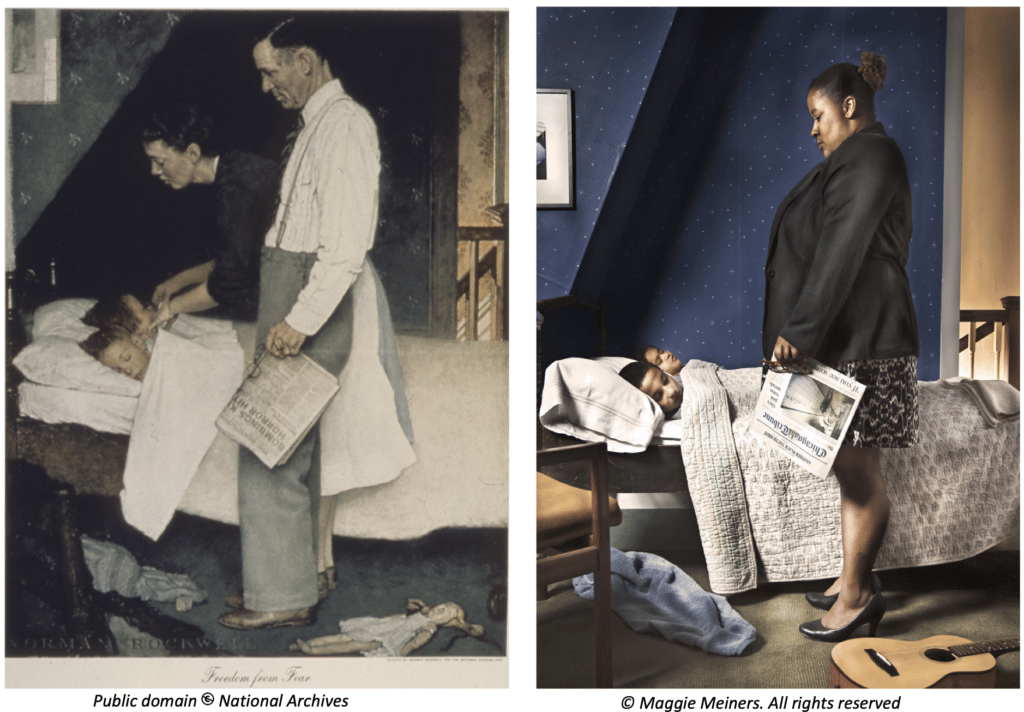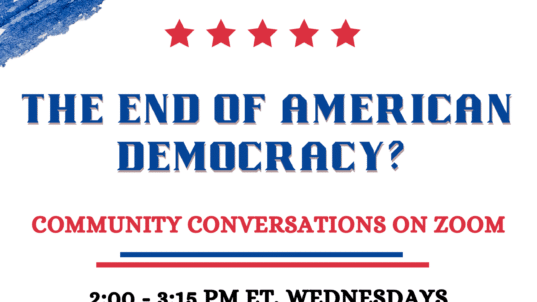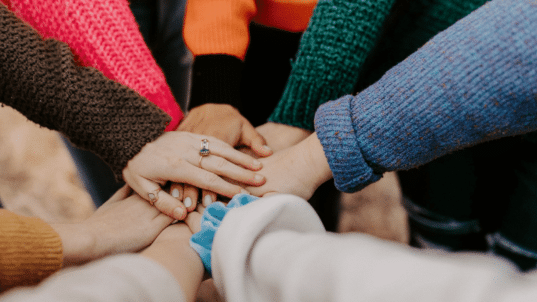
What does freedom from fear mean? And why is it important for democracy?
In this four-part exploratory conversation series, Four Freedoms: The Spirit of Democracy Today and Tomorrow, we helped each other explore different aspects of freedom. To do this, we looked at the four freedoms articulated by FDR as core human rights and as they are depicted by artists Norman Rockwell and Maggie Meiners: freedom of speech, freedom of worship, freedom from want, and freedom from fear. On June 8th, in our fourth and final discussions in this series, we explored freedom from fear. Below we have summarized some of the different ways the participants were thinking about freedom from fear and its importance for our democracy.
What do we fear? When you think of freedom from fear, what fears do you think of?
- Violence
- Gun violence—especially in light of the prevalence of mass shootings throughout the US
- Racially and ethnically-motivated violence, hate crimes
- Gender-related violence
- Child abuse and domestic violence
- War and other forms of state-sponsored or international violence
- Disease, disability, injury, and death
- Pandemics—this and others—and their effects not only on our own health, but also on our economy, our children, and the overall well-being of our society
- Global threats to civilization and all human life: nuclear war, climate change, environmental degradation
- Difference, change, disorder, uncertainty
- “Others”: our fears of, and discrimination against, others based on race, ethnicity, religion, gender, culture, immigration status, poverty/wealth, and politics
- The government, the state: fear of being unjustly accused, of not having due process, of being surveilled, taxed, imprisoned
- Losing our status: fear of losing our privileges, rights, roles, position, etc.
- Losing our democracy, fear of rising polarization, authoritarianism, both here and worldwide
- Poverty or economic fragility: fear of not having access to or being able to afford essentials, such as clean water, food, housing, healthcare, education, and transportation for ourselves, our children, and other family members
- Social isolation, loneliness, losing connection and meaning
- Losing hope
Why is freedom from fear important for a healthy democratic society?
- Democracy needs fearless citizens. In this way, freedom from fear connects with and is complementary to the other freedoms in this series (freedom of speech, freedom of worship, and freedom from want)
- Fear can be anti-democratic in other ways: when the fear of losing political power or other status leads people to suppress the voting and other rights of others
- Conversely, freedom from fear allows us to be bolder, to live more openly, and speak more freely—all necessary elements for a healthy democracy
- Fear can be both helpful and harmful: if we lack any fear, we may not act when needed; but fear can also make us irrational and is often overwhelming and paralyzing
- Some fears seem hard-wired (possibly as a survival mechanism) and universal across time and place
- It also seems universal to seek freedom from those fears, to better manage them, so we can have the courage to explore and learn from them, to act with resilience, compassion, and prudential judgment to manage those fears
- Fear is used, all too effectively, by politicians and others with certain partisan or commercial interests to manipulate and motivate us to fear and hate others, to give our support to candidates and causes that we wouldn’t otherwise support, to get us to turn on each other, and to destroy our democracy from the inside out
- Media effects: our social media, news media, and other mass media may also be contributing to—as well as profiting from—our distorted impressions and rising fears
- We’re drawn to fear, which makes us willing targets for it to be projected onto us
- When assessing our fears, we need to be thoughtful about comparisons to the past and be honest with ourselves
- Things weren’t necessarily or always “better” in the past. Depending on when, where, and whom is being compared, some fears may be genuinely worse now than in the past. But in other cases—when comparing other times, places, or populations—our impressions may be distorted by nostalgia, ignorance, or indifference as to how bad things were—and still may be—for others.
- Freedom from fear should not be an absolute freedom, trumping all other freedoms or providing a universal sense of security
- It matters how we respond to fear; the choices we make may not work—they may not, in the long run, make us more free or more secure
- Fear can be distracting or even debilitating: we may organize our lives around our fears rather than our hopes, and it may prevent us from participating in our democracy or even block out our ability to do other needful things
How can we better support and sustain freedom from fear?
- We need to learn to listen more and better, especially when we disagree, and to do so without shaming each other
- It might help if we reduced the stakes for losing elections: if the prospects of electoral losses are less dire, then elections will be less fraught with fear (and fewer grounds for voter suppression, etc.)
- We need a more genuinely representative democracy with effective majority rule (the current situation in the US is one of minority rule)
- More proportional representation–including abolishing the Senate and increasing the size of Congress
- Develop more citizen participatory mechanisms, including direct democracy (referenda, initiatives, etc.)
- A publicly-funded system to meet basic needs so that citizens are no longer fearful of not having water, food, shelter, access to healthcare, education, transportation, employment and are able to effectively participate in society and our democracy
- Consider implementing some of the policies of social democracies to address some of our economic fears (learn from Scandinavian democracies)
- Individually: work on our overcoming our fears, be smart about them (avoid/reduce risks) and take some action so as not to be controlled by fear
- Support and maintain the rule of law as against violence and survival of the fittest, richest, or most powerful
- Reduce our political polarization; increase empathy, civility, and cooperation
- Consider the consequences and disparate impacts of many policies on different communities
- Better manage fiscal concerns so that people don’t fear that we won’t have the needed resources
- Don’t be complacent: get involved in our communities and contribute our time, treasure, and/or talent to help others
- Stay positive; focus on finding answers and not the negativity often projected onto us; remind ourselves of the good and also be ready and willing to make “good trouble” to make change and make it better
- Fight against racism, anti-Semitism, sexism, and against the violence they foment
- To manage our fears about the environment, reduce consumption of water, plastics, fossil fuels for energy and transportation
- Work to change hearts as well as policies on violence, gun control, and many other issues
- Education is always key: we need to educate ourselves about threats, risks, and things we can do to address them
- Make intentional efforts to nurture and support our social connections, including family, friends, neighbors, all sorts of other social networks that help strengthen society and support us all
- Advocate for public policies that support these connections as well
- Shared life experiences, voluntary or not, can also help: school, public service, military service, work, parenting, etc.
- Physical proximity: rubbing shoulders not just at the water cooler but at the market, on the sidewalk, etc.
- The arts can be an entertaining and non-threatening way to get to know, imagine, and appreciate the other
- Engage—join an organization, a club, an activity
- Self-examination and discernment: ask what are we afraid of and why; question the source of our fears
- Be diligent in examining what we accept as truth; choose better sources for information
- Travel and openness to new experiences can also be a way to connect and appreciate the common humanity around us
- Understand that everyone is afraid; it’s part of shared humanity: the key is how we respond, the systems and policies we adopt, both collectively and individually, to moderate and manager our fears



